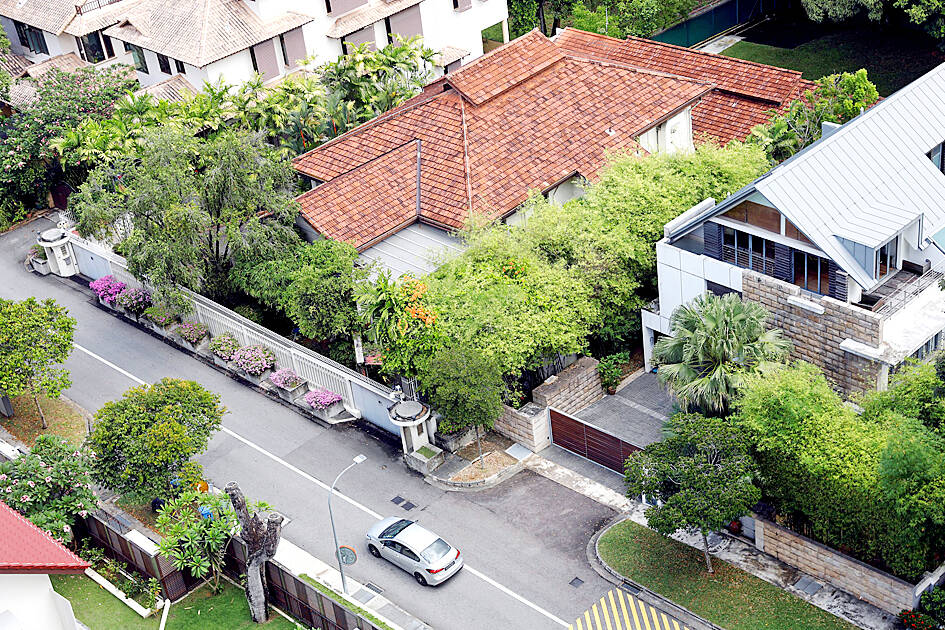The youngest child of Singapore’s founding prime minister Lee Kuan Yew (李光耀) yesterday said he would apply to demolish the statesman’s home in line with his wishes, following the death of his sister last week.
Lee Kuan Yew’s three children — one of whom is former prime minister Lee Hsien Loong (李顯龍) — were split on what to do with their father’s home after his death in 2015, in a public spat that saw the siblings estranged.
Eldest son Lee Hsien Loong, who stepped down as Singapore’s prime minister earlier this year, thought it should be up to the government to decide what to do with the property, including potentially retaining it as a heritage landmark.

Photo: Reuters
However, his sister, Lee Wei Ling (李瑋玲), who died on Monday last week, and younger brother Lee Hsien Yang (李顯揚) say the single-store bungalow, built in 1898 in central Singapore, should be demolished in accordance with their father’s wishes.
“After my sister’s passing, I am the only living executor of my father Lee Kuan Yew’s estate,” Lee Hsien Yang wrote on Facebook yesterday.
“In his will, he wished for the house to be demolished ‘immediately after’ Wei Ling moved out of the house. It is my duty to carry out his wishes to the fullest extent of the law,” he wrote.
He said he would apply to demolish the house and planned to build a small private dwelling to be retained by the family, adding that it was time for the government to approve the demolition.
The office of current prime minister Lawrence Wong (黃循財) did not immediately respond to a request for comment.
Lee Kuan Yew told the Straits Times newspaper in 2011 that he wanted the house demolished, because it would “become a shambles” if it were opened to the public, and he hoped its removal would improve land values in the neighborhood.
In 2018, a ministerial committee set up to consider the future of the house laid out three options, and said the decision would be left to a future government.
The options were to retain the property by gazetting it as a national monument or for conservation, retain the basement dining room which has the greatest historical significance and tear down the rest of the property, or allow the property to be fully demolished for redevelopment.
At that time, Lee Hsien Loong said he accepted the committee’s conclusion.

Auschwitz survivor Eva Schloss, the stepsister of teenage diarist Anne Frank and a tireless educator about the horrors of the Holocaust, has died. She was 96. The Anne Frank Trust UK, of which Schloss was honorary president, said she died on Saturday in London, where she lived. Britain’s King Charles III said he was “privileged and proud” to have known Schloss, who cofounded the charitable trust to help young people challenge prejudice. “The horrors that she endured as a young woman are impossible to comprehend and yet she devoted the rest of her life to overcoming hatred and prejudice, promoting kindness, courage, understanding

US President Donald Trump on Friday said Washington was “locked and loaded” to respond if Iran killed protesters, prompting Tehran to warn that intervention would destabilize the region. Protesters and security forces on Thursday clashed in several Iranian cities, with six people reported killed, the first deaths since the unrest escalated. Shopkeepers in Tehran on Sunday last week went on strike over high prices and economic stagnation, actions that have since spread into a protest movement that has swept into other parts of the country. If Iran “violently kills peaceful protesters, which is their custom, the United States of America will come to

‘DISRESPECTFUL’: Katie Miller, the wife of Trump’s most influential adviser, drew ire by posting an image of Greenland in the colors of the US flag, captioning it ‘SOON’ US President Donald Trump on Sunday doubled down on his claim that Greenland should become part of the US, despite calls by the Danish prime minister to stop “threatening” the territory. Washington’s military intervention in Venezuela has reignited fears for Greenland, which Trump has repeatedly said he wants to annex, given its strategic location in the arctic. While aboard Air Force One en route to Washington, Trump reiterated the goal. “We need Greenland from the standpoint of national security, and Denmark is not going to be able to do it,” he said in response to a reporter’s question. “We’ll worry about Greenland in

PERILOUS JOURNEY: Over just a matter of days last month, about 1,600 Afghans who were at risk of perishing due to the cold weather were rescued in the mountains Habibullah set off from his home in western Afghanistan determined to find work in Iran, only for the 15-year-old to freeze to death while walking across the mountainous frontier. “He was forced to go, to bring food for the family,” his mother, Mah Jan, said at her mud home in Ghunjan village. “We have no food to eat, we have no clothes to wear. The house in which I live has no electricity, no water. I have no proper window, nothing to burn for heating,” she added, clutching a photograph of her son. Habibullah was one of at least 18 migrants who died